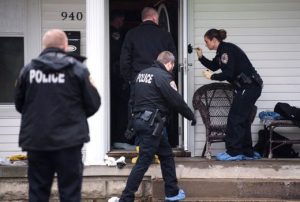Homicide Detective as a Career Choice

The career path I’m leading towards is criminal justice. But more specifically, a homicide detective. A homicide detective’s job is to investigate murders and try to solve many of the mysteries surrounding unexplained death
The main goal is always solving the case – to identify what happened, how it happened and who is responsible. Interviewing witnesses, collecting evidence, and puzzling through the facts are all important parts of the job. Sometimes there are no answers to be accounted for but even in those cases, the detectives must check out every possible outcome. Conducting investigations is the bulk of any homicide detective work.
It often starts at the scene of the crime but not always. The work comes in terms of following clues, piecing together event sequences, and trying to figure out exactly what happened when the person(s) died. Interviews with witnesses are an important element as well as investigating relationships with the victim’s family or friends. Going through paperwork like the victim’s receipts, credit card charges, phone record or mail is essential. The goal is to put together a puzzle of how both the victim and the suspect were living life and making choices. Psychology can be helpful as well as forensic science.
The detective is basically trying to reconstruct the days and hours that led up to the death. Detectives also look for evidence that can lead to arrest – or some type of identification – of the killer or accomplices. It can include everything from blood samples to measurements taken from the crime scene. A homicide detective has to not only know what to look for, but also understand how to collect and store evidence so that it can be used in court.

Choosing Criminal Investigation as a Career.
A homicide investigator is not an entry-level position but a role earned through promotion after many years of working as a police officer. The minimum requirements to become a homicide detective are a high school diploma; some may also require a bachelor’s degree. If you chose not to go through the police academy, you may become a private investigator. Private Investigators are detectives that work for their clients rather than law enforcement agencies. They don’t solve serious crimes like murder but they can help find missing people among other things as well. Training and experience are required to obtain the skills necessary to become a homicide detective. The following skills are key for success as a detective: problem solving, critical thinking, written/oral communication, ethical behavior, attention to detail and keen understanding of human motivations.
The Bureau of Labor Statistics reports that detectives and criminal investigators earn an an average annual wage of $85,020. Forensic Science Technicians who assist in the work of these detectives can earn an average wage of $58,230 per year or $27.99 an hour. Typically a tech needs a college degree but does not need prior experience. This could be a practical way to build on experience necessary to become a good detective.
What is the value and motivation of choosing this career?
My time growing up outside DC has helped me appreciate the value of a good detective. Families are comforted when they find closure in knowing the facts and justice is served.
As a kid, I always loved watching crime shows and I knew criminal justice was going to be the right spot for me. I love watching shows like The First 48 because it’s real life and you see how the detectives really work on these cases. When my best friend died and no one was able to solve his murder that really put the fuel on the fire for me. In that time I really wanted some answers but no one had them. I want to become a homicide detective so I can help people especially the victim and their families. I want to be able to help put them at peace and give them all the answers they deserve. I like the fact homicide detectives speak for the dead in a way. I feel like this job would be a perfect fit for me because I’ve been in those shoes. I’ve wanted answers and never got them. Just to know I’m helping someone means the world to me. I always knew my career would have to do with criminal justice because I feel like that’s what I was made for. It brings me joy to help people who went through the same situation that I did.
Here is a link to the top 10 cities for criminal justice employment:
https://www.criminaljusticedegreehub.com/top-cities-for-criminal-justice-jobs/
https://www.bls.gov/ooh/life-physical-and-social-science/mobile/forensic-science-technicians.htm
As of January 2019, the city with the highest homicide rate is East St. Louis, IL. Followed by Chester, PA and St.Louis, MO. The trend of homicides in DC area varies through the years. It seems to go up then back down and up or down again. Often the victims of violent crime are caught up in poverty, gangs or drugs but not always.
20-Year Homicide Trend in Washington DC
| 2018 | 2017 | 2016 | 2015 | 2014 | 2013 | 2012 | 2011 | 2010 | 2009 |
| 160 | 116 | 135 | 162 | 105 | 104* | 88 | 108 | 132 | 144 |
*The citywide 2013 homicide statistics include the 12 victims of the Washington Navy Yard shooting incident that occurred on September 16, 2013.
Personally, I plan on moving out of the DMV and working as a detective. The First 48 follows murders in different states and the cities that seem active and interesting are Oklahoma City, Atlanta and New Orleans. The detectives tend to have their hands full because those areas are ranking up in homicides.
https://work.chron.com/can-become-detective-being-police-officer-16565.html
https://study.com/articles/Homicide_Investigator_Requirements_Duties_and_Career_Info.html
https://www.neighborhoodscout.com/blog/highest-murder-rate-cities
